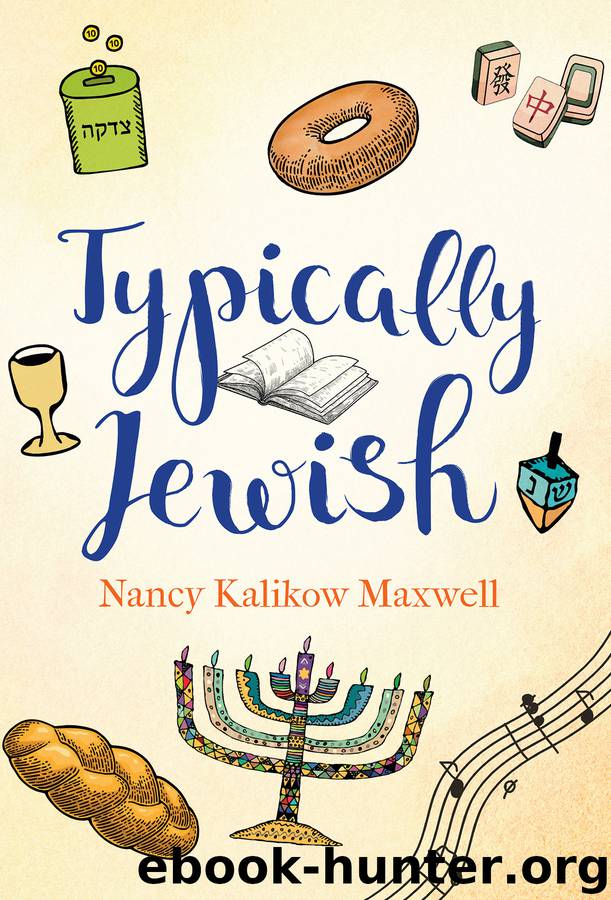Typically Jewish by Nancy Kalikow Maxwell

Author:Nancy Kalikow Maxwell
Language: eng
Format: epub
Tags: SOC049000 Social Science / Jewish Studies, REL040010 Religion / Judaism / Rituals & Practice
Publisher: The Jewish Publication Society
Tattling Tattoos
At one time, seeing a tattoo would have strongly indicated that the person sporting it wasn’t Jewish, but no longer. Quite the opposite, as Ron Dicker explains in his Haaretz article “Jews with Tattoos”: “The use of body art to express a connection with Judaism began on the fringe but is now moving toward the mainstream.”
Many Jews have long assumed their religion forbids any form of body art. However, as Bible professor Nili S. Fox explains, the matter has always been more mottled than a black-and-white prohibition. While the Hebrew Bible does demand, “You shall not make gashes in your flesh for the dead, or incise any marks on yourselves,” several biblical figures were “marked” in the Bible, starting with Cain. Furthermore, evidence suggests the practice was more prevalent in ancient times than many realize.
Nonetheless, in more recent times, most Jews came to believe that body art was forbidden and anyone possessing a tattoo would be banned from a Jewish cemetery. However, it turns out this widely repeated restriction is a bubbe meise (old wives’ tale). “Nothing in Jewish law prohibits a tattooed person from being interred in a Jewish cemetery,” explains Orthodox rabbi Chani Benjaminson.
Rather, most religious Jews oppose tattoos because of the Jewish principle of b’tzelem Elohim, meaning that we humans are made “in God’s image.” Because Judaism views the body as a holy, God-given instrument, altering one’s body through permanent markings can be seen as an affront to God.
More secular Jewish (and non-Jewish) mothers oppose their children’s body ink for a more practical reason: they fear the kids will come to regret it. And in many cases they are right. Supposedly the most frequent request of tattoo artists is to remove an ex-lover’s name.
For Jews as well, tattoos are also tainted with the memory of concentration camp victims being forcibly inked with identification numbers. “I would never do that to my father,” says one Jewish juror, the daughter of a Holocaust survivor.
Yet some younger Jews are reclaiming the tattoo specifically to memorialize relatives who endured the Holocaust. Joseph Metz, for one, had his grandfather’s six-digit Holocaust number inscribed on his own wrist to honor his grandpa’s memory. “What was done to him in hate, I do in love,” he explains. Metz is also continuing his grandfather’s educational mission of visiting Mississippi high schools to educate students about what happened. “That is why I have this tattoo,” he says. “We must never forget.”
And other young Jews are using tattooing to otherwise express their Jewishness. One Jewish juror reported that her son was the only member of his Taglit-Birthright Israel delegation who returned from Israel without a new tattoo. Most had chosen artwork featuring Jewish images, such as a Star of David or a menorah.
Even one rabbi, Marshal Klaven, spiritual leader of Congregation B’nai Israel in Galveston, Texas, first began inking his body at age sixteen, when he returned from Israel. “I decided to avow my place among my people by tattooing a small Star of David . .
Download
This site does not store any files on its server. We only index and link to content provided by other sites. Please contact the content providers to delete copyright contents if any and email us, we'll remove relevant links or contents immediately.
| Haggadah | Hasidism |
| History | Holidays |
| Jewish Life | Kabbalah & Mysticism |
| Law | Movements |
| Prayerbooks | Sacred Writings |
| Sermons | Theology |
| Women & Judaism |
The Secret Power of Speaking God's Word by Joyce Meyer(3056)
Man's Search for Meaning by Viktor E. Frankl(2644)
Mckeown, Greg - Essentialism: The Disciplined Pursuit of Less by Mckeown Greg(2404)
MOSES THE EGYPTIAN by Jan Assmann(2392)
Devil, The by Almond Philip C(2302)
The Complete Dead Sea Scrolls in English (7th Edition) (Penguin Classics) by Geza Vermes(2253)
Unbound by Arlene Stein(2247)
I Capture the Castle by Dodie Smith(2010)
Schindler's Ark by Thomas Keneally(1848)
The Invisible Wall by Harry Bernstein(1780)
The Gnostic Gospel of St. Thomas by Tau Malachi(1766)
The Bible Doesn't Say That by Dr. Joel M. Hoffman(1664)
The Secret Doctrine of the Kabbalah by Leonora Leet(1585)
Political Theology by Carl Schmitt(1561)
The Jewish State by Theodor Herzl(1519)
A History of the Jews by Max I. Dimont(1501)
The Dead Sea Scrolls Bible by Martin G. Abegg(1491)
The Book of Separation by Tova Mirvis(1472)
Oy!: The Ultimate Book of Jewish Jokes by David Minkoff(1354)
